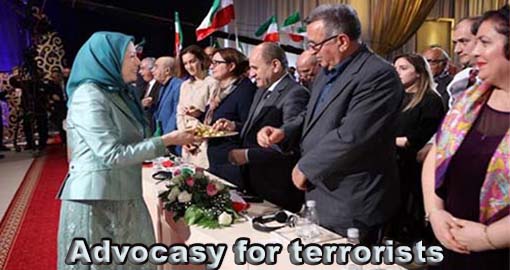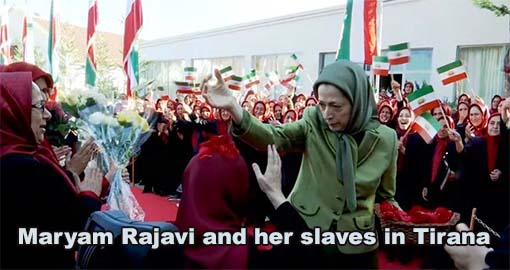As democratic elections go, Albania’s upcoming parliamentary elections are as bad as it gets. Protests and turmoil have characterised the leadup to the June election. The official opposition is continuing a three-month boycott of parliament and is threatening to boycott the election itself. The protest is rooted in accusations of corruption and bias in the government of Prime Minister Edi Rama.
 |
| Elona Gjebrea at the March 2017 Mojahedin Khalq rally in Tirana, Albania with Maryam Rajavi |
Ongoing and apparently unsolvable problems with the narco-trade and drug cartels, arms smuggling and people trafficking, add fuel to the corruption charges. Politicians from all sides appear unable to either successfully expose these crimes or escape accusations of collusion with them.
One example of the complexity of Albania’s difficulties can be found by examining the activities of Albania’s deputy Anti-Trafficking Coordinator, Dr Elona Gjebrea, who is also the Deputy Minister of the Interior. In March 2017, Gjebrea attended a Conference held by the Welsh Government and the UK Crown Prosecution Service which focused on the problem of Albanian slavery victims in the UK. More victims of modern slavery from Albania end up in the UK than from any other country – 17% of all UK cases. The introduction of the Modern Slavery Act in 2015 in the UK has greatly enabled anti-slavery groups and campaigners in confronting this problem.
In Albania, Elona Gjebrea also has close ties to the United States on the issue of people trafficking and slavery. The US embassy in Tirana, Albania acknowledged the State Department’s annual Trafficking in Persons report in June 2016 by saying, “The United States appreciates the close cooperation with the Government of Albania, civil society and especially National Anti-Trafficking Coordinator Elona Gjebrea on our shared goal of combatting the global phenomenon of Human Trafficking.”
In December 2016, the United States allocated an additional $3m funding to support Albania’s “criminal justice system in the fight against organized crime and corruption”. Deputy Interior Minister Gjebrea welcomed the agreement and the resources.
So far, so good. Albania is apparently taking a strong stance against modern slavery and the US backs these efforts. But there is another side to this story. On January 16, 2017 Gjebrea, along with some other Albanian personalities, attended a clandestine music concert in Tirana hosted by the Iranian exile Mojahedin Khalq organisation (MEK) which is now based in Albania. Gjebrea claimed the Albanian people were in “solidarity with the Mojahedin”. Then, in March, she attended the MEK’s New Year rally with 3,000 of its members and leader Maryam Rajavi. She again heaped praise on the MEK and its leader.
Gjebrea’s open support for the group is shocking for several reasons. Not least because the MEK is a highly controversial group with a violent background. The entire MEK was forcefully transferred from Iraq to Albania by the Americans to satisfy Iraqi demands to rid their country of the final remnants of the Saddam Hussein regime. Even up until 2016 the MEK were linked to insurgents like Al Qaida in Iraq and Daesh. America paid several million dollars to Albania’s government and promised help to de-radicalise the terrorists.
This did not happen. Instead of de-radicalisation, the organisational structure which had operated in Iraq for three decades was allowed to continue in Albania. The 3,000 MEK members were consolidated and isolated behind closed doors and shuttered windows in dedicated apartment blocks. This led to speculation about the future of the group. In rallies, such as the one Gjebrea attended, the MEK continues with its promise of regime change in Iran – which in the past the MEK has pursued through violence and terrorism. When John Bolton or Senator John McCain lobby for the MEK it is clear they are following an anti-Iran political agenda. But does Gjebrea share that agenda toward Iran? Does Albania? Politicians from both government and opposition would benefit from a more informed and thoughtful approach if they are not to antagonise Iran as a potential trading partner for their country.
But the really shocking aspect of Gjebrea’s support for the MEK can only be based either in ignorance or as a result of corruption. It is well known that the MEK operates as a mind control cult. It is organised as a totalitarian system headed by an authoritarian leader who demands total unquestioning obedience from every member at every level. The group operates outside legal, moral or cultural norms. One of the defining characteristics of this cultic state – long exposed by expert analysis of the evidence– is that the members are held in a state of modern slavery. They endure forced labour and forced military service. In a sense, they are modern day Gladiators, fighting not for the ancient Romans but for their modern masters, those who pay for the MEK as mercenaries.
Let us remind ourselves that Elona Gjebrea is Albania’s deputy anti-trafficking coordinator. Her role is to prevent slavery and trafficking. How then does she explain her support for modern slavery in Albania itself? When she praises Maryam Rajavi is she sincerely unaware that the cheering, flag waving, applauding audience are actually slaves who have no choice but to obey Rajavi’s dictates? Is she genuinely unaware that MEK members who have worked for decades without pay are still denied their individual UNHCR refugee allowance in Albania because it is paid directly to the MEK leader? Maryam Rajavi is no other than a slave gang-master.
 |
| Maryam Rajavi and her flag waving slaves in Tirana, Albania |
Gjebrea is only one of several high-profile personalities who have recently succumbed to the persuasive lure of the MEK. But what huge irony that in her role at the Interior Ministry, she has not only failed to ensure that MEK members are de-radicalised and returned to normal life, she has endorsed and encouraged the continuation of their slavery in her own country. When such a shocking situation so openly exists, it is not hard to see why the parliamentary elections are so fraught with anger and disaffection. For a country so beholden to America for help and support, it is a shame better guidance cannot be proffered to get Albania’s democracy back on track.
Massoud Khodabandeh Director at Middle East Strategy Consultants.
Co-authored by Anne Khodabandeh

